What is Want? (Understanding Want)
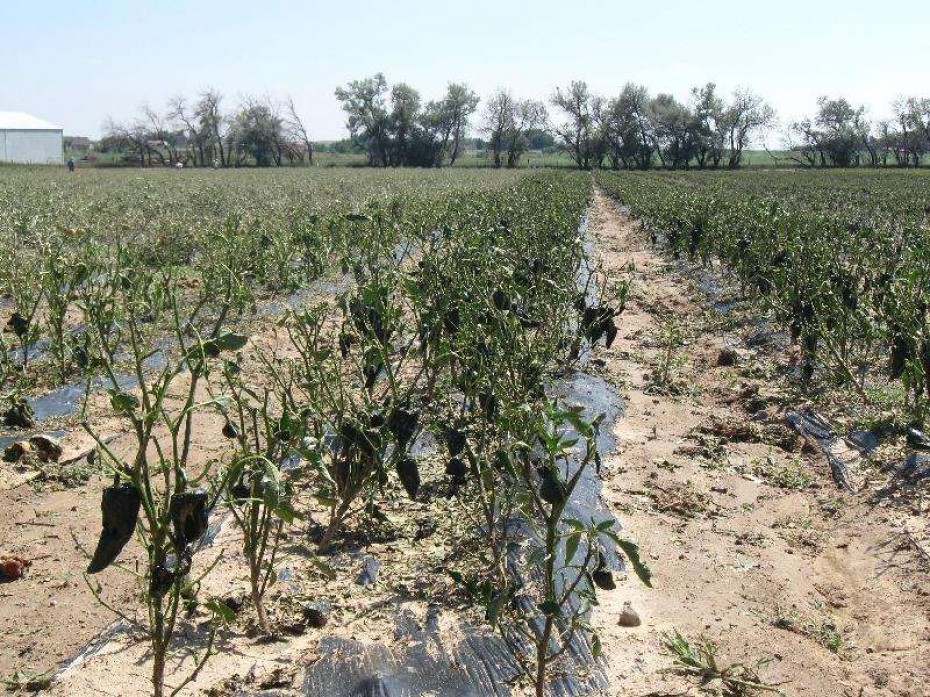
Hunger and want are so unreal and unknown to us that we don’t even blink an eye at it because the want in the world is unknown or not personal to us.
Continue Reading ›The Dignity of Work

I told you about my new neighbor, the Port-o-Let. One morning, a new big truck came pulling up outside my apartment, and this guy in a yellow vest hopped out.
Armed with a long hose, he proceeded to suck the contents out of the Port-o-Let. Quick as lightning, he hopped back in his truck and was off. Now he’s been showing up in his big green truck each week, happily performing his duty.
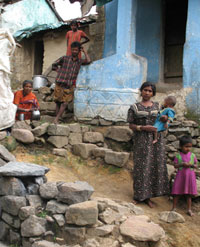 And it got me thinking. It’s easy for me to complain about the little parts of my job that bug me (like paperwork and deadlines and meetings). Watching this man gave me a new appreciation for my job. Not, by any means, that I think there is more dignity in what I do than what he does. I believe that there is dignity in the work that God has given each of us to do, no matter how our culture prompts us to view it.
And it got me thinking. It’s easy for me to complain about the little parts of my job that bug me (like paperwork and deadlines and meetings). Watching this man gave me a new appreciation for my job. Not, by any means, that I think there is more dignity in what I do than what he does. I believe that there is dignity in the work that God has given each of us to do, no matter how our culture prompts us to view it.
And learning more about the work others do around the world can give us a new perspective on our own work.
Ganesan, shown here with his family in front of his home in India*, works each day as a day laborer in other’s fields to feed his wife and two children.
Working as a day laborer is a common occupation of the parents of Compassion children, as most can’t afford to own land themselves and don’t have the education to seek other employment.
Ganesan earns about 450 Rupees a week for his work — about $10.
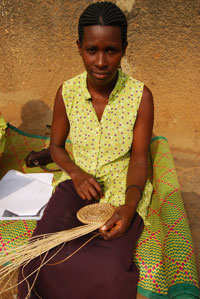
Resty is a proud mother of two in Uganda.
Her husband is an alcoholic, so a lot of the time she has to find ways to provide for her children by herself.
She hadn’t worked before, but through the Child Survival Program, she learned how to start a small business, selling charcoal by the roadside.
She gets about 20,000 Ugandan shillings a month selling charcoal — about $12.
She also learned to weave baskets through the CSP, and sells each basket she makes for about $1.
Ryan and Axl’s dads work as fishermen in Indonesia. (And, yes, that is as in Axl Rose. His dad liked rock music.)
Their fathers leave for the ocean on fishing expeditions and are gone from their family for six weeks at a time catching mackerel.
Each trip, they earn roughly 700,000 Indonesian Rupees — about $77.
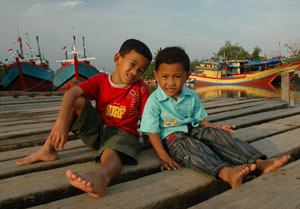
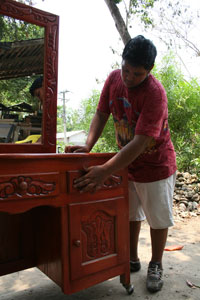 Where 17-year-old Ezequiel grew up in southern Mexico, the average worker earns $12 a week, working 20-hour days to harvest mangoes and bananas.
Where 17-year-old Ezequiel grew up in southern Mexico, the average worker earns $12 a week, working 20-hour days to harvest mangoes and bananas.
But Ezequiel’s dad is a carpenter who makes beautiful furniture.
At his Compassion child development center, Ezequiel learned how to carve wood, and together with their different skills, Ezequiel and his dad can make pieces like this dresser they just finished.
Once he graduates, a skilled woodworker like him can earn up to $55 a week, compared to the $12 of the day laborers harvesting mangoes.
In India, Suren and his wife, Rinu, both used to work full time in a brick factory. Suren lived in a dormitory at the factory, and Rinu would travel home each day to care for the family. Put together, they earned roughly 250 Indian Rupees a week — about $6 — for their family of six.
But Kajali (in the dark blue sweater) became sponsored, and her sponsors gave them a family gift, with which they bought a cycle van.
Now Suren earns many times over as a cycle van driver what he used to earn at the brick factory. When he was working at the factory and couldn’t provide a proper home for his family, Suren says, “as a parent, I felt worthless and of no good use.”
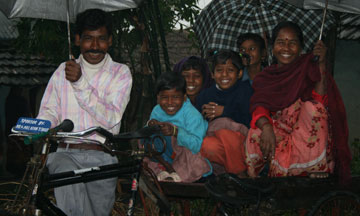
Those words tear my heart, and it’s sadly not the first time I’ve read the sentiment. How many mothers and fathers are out there, working so hard each day as farmers, drivers, and traders, scraping to provide just one or two meals for their children, and still feeling like failures?
Yet it’s so encouraging to know that even a small gesture can transform a family’s life. Suren is now filled with pride for the way he can care for his family. He says, “through Kajali and her beloved sponsor, we have now tasted of the goodness of God’s awesome power.”
<hr/ >
*NOTE FROM EDITOR: This content honors Compassion’s historical work in India. While we no longer have an India sponsorship program, we are grateful for the lives changed and meaningful work achieved through our sponsors and donors in our nearly 50 years there. For a detailed explanation of the end of our sponsorship program in India, please visit: compassion.com/india-update.
Continue Reading ›Ask the Field: El Salvador and Haiti
Okay, everyone. Limber up those fingers. It’s time for the next round of Ask the Field. It’s time for you to ask questions of two of my fabulous coworkers, Ephraim Lindor of Haiti and Roberto Medrano of El Salvador.
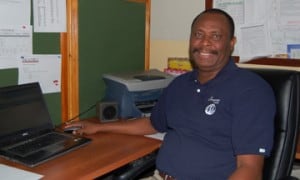 Ephraim has been working with Compassion Haiti for 22 years. (Talk about perseverance!)
Ephraim has been working with Compassion Haiti for 22 years. (Talk about perseverance!)
He first worked for Compassion as a translator, and he is now the field communications supervisor for Haiti. His daily work includes interviewing Compassion beneficiaries and writing stories about their success.
Ephraim is always smiling, and he loves watermelon. Besides all the work he does for Compassion, he’s a pastor at his local church, a loving father of a 21-year-old woman and a 15-year-old boy, and a loving husband of 23 years.
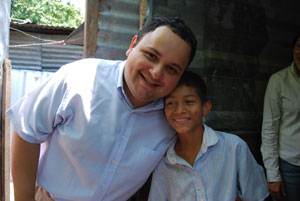 Roberto has been working with Compassion El Salvador for 6 years. He first worked for Compassion as field communications specialist and now he is the communications and tours specialist for Central America and the Caribbean, which means he is in charge of training and supporting all Compassion countries in that region for communications and tours. (He’s a busy guy!)
Roberto has been working with Compassion El Salvador for 6 years. He first worked for Compassion as field communications specialist and now he is the communications and tours specialist for Central America and the Caribbean, which means he is in charge of training and supporting all Compassion countries in that region for communications and tours. (He’s a busy guy!)
Roberto is the youth pastor of his church, and although he is just 30 years old, he has been preaching for more than 26 years. He was a child preacher, and that is one of the reasons why he loves Compassion’s ministry — he has witnessed first hand the impact of God’s Word when you are a child. He is crazily in love with his beautiful wife, Yolanda, an ORU graduate that fully supports him in working on behalf of children.
So now it’s your turn to ask away! You know the drill by now — I’ll choose 10 of your questions for them to answer.
Give a Gift, Not Guilt
Last week, I was able to attend the Willow Creek Association Leadership Summit at a satellite location here in Colorado Springs. It was so encouraging to hear many of the speakers talk about the need to lead people toward answering the Biblical mandate to speak up for and care for those in need.
Something Wendy Kopp said at the Summit struck me about how we approach leading others toward caring for those in need.
Wendy Kopp is the founder and CEO of Teach for America, a non-profit that asks college graduates to commit to two years of teaching in under-resourced schools.
She was asked how she approaches asking these graduates — some of who could otherwise accept six-figure jobs — to sacrifice so much, putting aside wealth and “success” to teach in schools many would avoid. She said (and this is paraphrased, as my little hand could only scribble so fast as she answered):
You’re giving people an opportunity to be part of something larger, and of significance — people want that … are we afraid to ask people to sacrifice and set a high bar? Your own personal conviction about the work makes it easy to ask others to sacrifice because you’re giving them a gift that will change their lives.
When we tell others about the opportunities to care for those in need, we might feel like we’re putting a burden on them, but far from burdening them, we’re giving them a gift. We’re giving them the opportunity to enter into another aspect of our relationship with Jesus as we follow him.
Several times when talking with someone who has come across the book I wrote about responding to poverty, they say they’re scared to read it. So many are scared of this issue of poverty, and understandably so — it’s big and hairy and complicated. And God might ask us to do scary things.
But I think there’s a third reason people are afraid of poverty — they’re worried a big, fat load of guilt is going to be placed on their shoulders. We’ve been bombarded by so much guilt when it comes to poverty, seeing so many images that evoke guilt and being told “shame on you for drinking that Starbucks instead of caring for a baby.”
Are we guilty for not responding to God’s mandate to care for those in need? Yes, but God hasn’t appointed us as judges of others. He has appointed us as messengers of his grace. And I think when we do approach others not with guilt but with grace, they grasp that helping those in need isn’t about checking off a requirement on our good-Christian to-do list so that we can not feel so guilty. It’s about our relationship with Christ — about following him, obeying him, and knowing him all the more as we become like him in our service to others.
“He defended the cause of the poor and needy, and so all went well. Is that not what it means to know me?” declares the Lord. (Jeremiah 22:16, NIV, emphasis added)

What’s Your View?
My husband and I first moved into our apartment because of the great view it afforded us — not of an apartment parking lot, which I have grown quite tired of — but of beautiful leafy green bushes and the Rocky Mountains.
Pitying myself for still living in an apartment, my view was my solace.

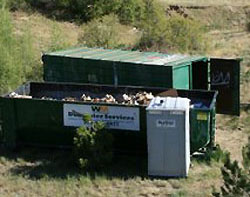 “That’s odd,” I thought, as he drove away.
“That’s odd,” I thought, as he drove away.
Not long after, there was more beeping. And another big green dumpster. And then another truck pulled up, and my new green neighbors were met with a shiny new Port-o-Let. I was less than thrilled.
It seems that our little view had become operating central for the crews that were methodically painting our entire apartment complex.
Each morning, instead of gazing out at my view and enjoying the chirping of the birds and the occasional sight of a fox bounding down the ditch, I gazed down at work crews banging in and out of the Port-o-Let and whistling along to the polka music blaring from the trucks. Again, less than thrilled.
As they moved in and got comfy, they got messier and messier. Trash flung here and there, half-started painting projects, and an overflowing dumpster.
Each day, instead of gazing past it all to the Rocky Mountains, which still loomed as tall as ever, I found my eyes fixated on this blight on my view.
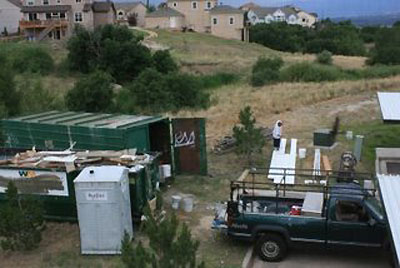
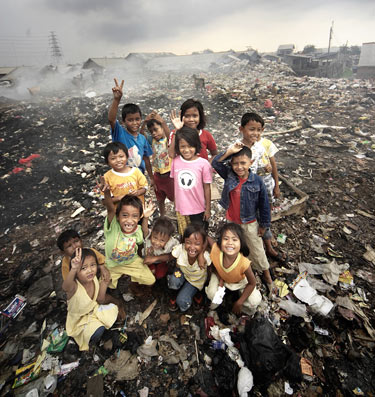
These children are smiling and laughing, despite being surrounded by worse conditions.
I had developed tunnel vision, or garbage vision, only noticing each day not the incredible blessings of God around me — the trees and mountains and birds who still chirped along with the polka music — but only what was in my life that wasn’t right, that I didn’t want to be there.
God blesses me so much every day. Sometimes I see it, and other times I don’t see the blessings for the garbage. What’s your view? How do you remember the good God has given you instead of what’s still not quite right?
Throw-Aways
I’ve been putting off writing this post. There are some things that are just easier not to think about.
They’re called “throw-aways,” people whom the world has no use for. (more…)
10 Questions With Edwin Estioko
Recently, we gave you the chance to ask Edwin Estioko, our Field Communication Specialist in the Philippines all your burning questions about himself, the Philippines and Compassion in the Philippines. Here are his answers …
1. Can you tell about the time when you first decided to work for Compassion? (Catherine)
Before Compassion I was production manager for OMF Literature (the biggest Christian publisher in the Philippines) and a writer of children’s books. I grew up at church serving and teaching little children; playing with them and just enjoying their company. When I saw the ad for a Communications Specialist for Compassion International in the Philippines, I was literally drawn in. Feeling a strong sense of peace and confidence that the Lord was calling me to this beautiful ministry for children, I applied for the post and on the same week filed for resignation from OMF despite not knowing for sure whether Compassion would hire me or not. Thank God they did.
2. What goals do you hope to accomplish in your area? (Jason)
I hope that through the photographs I take and stories I write about Filipino children I could reach as many readers as I can around the world so that more and more people would stand up for children and advocate for them, so that more and more could see that thousands of children and families here in the Philippines truly lack opportunities for a better life (or simply for a livable minimum) despite the fact that they are hard working and full of faith.
What drives me is Proverbs 31:8, “to speak up for those who cannot speak for themselves.”
3. What have been the toughest times of your life, and what have you learned from these trials? (Juli Jarvis) (more…)
Ask the Field: Uganda and the Philippines
Have you ever wondered what it’s like to live in the country where your sponsored child lives? What it’s like to work for Compassion? What gets the people going who do this work each day? If so, now’s your chance to “Ask the Field!”
Ask your burning questions of our staff from around the world about their country, their work — whatever you want to know. I’ll choose 10 of your questions for them to answer. (Being the protective mother bear that I am, I’ll make sure to choose culturally appropriate questions. What’s polite dinner conversation in the U.S. may not be appropriate in their country, so keep this in mind as you ask.)
I’d like to introduce to you Dennis Tumusiime and Edwin Estioko.
 Dennis is a native of Uganda and works as a tours and visits specialist for Compassion International Uganda. (Did you know that Compassion doesn’t send a bunch of Americans over to other countries to minister to the children, but works through natives of that country so they can culturally contextualize the ministry? That’s pretty cool.) Anyway, Dennis has been working for two years with Compassion to coordinate and plan visits from sponsors and donors to Uganda. (So, if you visit Uganda, you’ll probably get to see that smiling face!) Coordinating all these trips means he’s quite an adventurous man.
Dennis is a native of Uganda and works as a tours and visits specialist for Compassion International Uganda. (Did you know that Compassion doesn’t send a bunch of Americans over to other countries to minister to the children, but works through natives of that country so they can culturally contextualize the ministry? That’s pretty cool.) Anyway, Dennis has been working for two years with Compassion to coordinate and plan visits from sponsors and donors to Uganda. (So, if you visit Uganda, you’ll probably get to see that smiling face!) Coordinating all these trips means he’s quite an adventurous man.
 Edwin Estioko began working for Compassion six years ago and is originally from Quezon City, Philippines. He is Compassion’s Field Communication Specialist in the Philippines and writes stories about and takes pictures of the ministry that is happening through Compassion International Philippines. He is married with no kids, so he and his wife can easily consider all the Compassion children as their own.
Edwin Estioko began working for Compassion six years ago and is originally from Quezon City, Philippines. He is Compassion’s Field Communication Specialist in the Philippines and writes stories about and takes pictures of the ministry that is happening through Compassion International Philippines. He is married with no kids, so he and his wife can easily consider all the Compassion children as their own.
Dennis and Edwin are excited to answer your questions, so ask away!
How Can I Fight Poverty?
How can I help fight poverty? What in the world can I do? The problems are just so big, and I’m just so small. I want to be used by you, God, but I just don’t know what to do.
I’ve thought and prayed these things many times. When viewing this world with its huge statistics of dread that loom over us (one BILLION people living in poverty), have you ever just felt stuck? Paralyzed? Anaesthetized? Confused? Helpless? Hopeless?
I’ve felt all those things. Usually when I’m looking at two things:
- The enormous earth, jam-packed with dreadful statistics, and
- Me
They both seem like depressing prospects.
Thank God this is not about me or you. Thank God for His grace. When the Lord called out looking for someone to be his messenger, “Whom shall I send? And who will go for us?” (Isaiah 6:8, NIV), He didn’t say “Whom shall I send who has a doctorate degree? Who will go for us who’s a super-swell, smart, sophisticated, experienced guy?”
No, God doesn’t put the same prerequisites on his servants that we put on ourselves. He seems quite eager to use each one of us as his servants, just the way he made us.
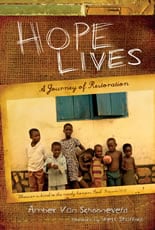 I recently wrote a book about responding to poverty, Hope Lives, and between you and me, this is a bit crazy. Don’t tell anyone (especially my marketers), but I’m just a goofball from Colorado who loves donuts and reality television. But I’m a goofball who (quite audaciously) called out to God, “Here am I, send me!”
I recently wrote a book about responding to poverty, Hope Lives, and between you and me, this is a bit crazy. Don’t tell anyone (especially my marketers), but I’m just a goofball from Colorado who loves donuts and reality television. But I’m a goofball who (quite audaciously) called out to God, “Here am I, send me!”
And you know what? God (quite audaciously, in my opinion), said “OK.” I’m tempted to think He might need a stricter HR department, but those are just the lies of the enemy. God wants to use each one of us (I mean you) to reach out and help His hurting world, no matter how insufficient we think we are.
We might not all be missionaries or nurses or have doctorate degrees in poverty, but God did plant a little seed, a little talent, in each of us that He wants to use and grow. There’s a guy who works here at Compassion whom God gave the talent of rapping. Yes, rapping. And he’s using it to speak out against poverty. There’s a woman who loves to write letters, and she’s using this gift to write letters of encouragement and hope to dozens of children in poverty.
Maybe you can’t write or rap, but what can you do to serve others? Bake? Fix cars? Persuade? Sew? Tap Dance?
No matter how small (or random) our talent seems, God can use it. He can multiply our offering that seems so measly and make it into something incredible, just like the little boy with the two bitty fish that God used to feed 5,000 (John 6). God gave me the gift of writing.
The small step of faith I took in this has now been multiplied by God, through Hope Lives church kits which guide churches through a five-week journey of exploring how God wants us to respond to poverty. Now how crazy is that?
I believe God is waiting for each one of us to look past the looming, seemingly impossible statistics, forget ourselves and our own insufficiencies, and simply say: “Here I am God, send me.” And I bet we’ll be flat-out flabbergasted by what he does.
Smile
I just got this cute, cute picture of Pamela at her child development center, viewing herself on the blog from Wednesday’s post! Samuel says she was embarrassed at first but couldn’t help smiling once she saw it.


The Journey of One Letter
Have you ever wondered how your sponsored child’s letter gets to you? The long journey it takes from Tanzania or Thailand to Connecticut or California? There’s a lot more to it than you might think!
Samuel Llanes, Guatemala’s Field Communication Specialist, gives us a peek at the journey of one letter from Guatemala to a sponsor in Australia.

Cultural Compassion
“Given the extensive comments in the Bible regarding the importance of taking care of the poor, we expected to see a larger distinction between the responses of born-again Christians and non-Christians.” – David Kinnaman, president of the Barna Group


